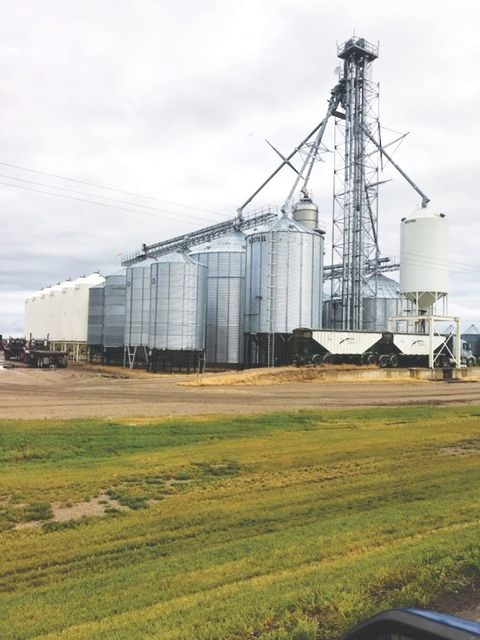An impressive farmyard set-up catches the eye of travellers driving down the road between Estevan and Oungre. The big bins, scales, and augers east of Torquay on the north side of Highway 18 often make people slow down wondering about the operation and the person running it.
Lorne Hanson’s family is now working about 18,000 acres of land in the Torquay area. His son, nephew, grandson and step-grandson are the main helpers, but that piece of land takes more people to farm.
To get the crop off the fields Hanson has to run four combines with 45-foot headers, two grain carts running around the field and unloading the combines on the go and four semi-trucks hauling grain. That means that there are about a dozen people working on the field throughout harvest.
By the time the storm and rain hit the area last weekend, Hanson already combined nine quarters of peas. The crop was turning out quite well, with 44,000 bushels put into bins within the first three days of harvesting. As soon as the peas is done, the harvest operations will turn to durum, wheat and canola.
Some time ago, the family had been planting corn, but just as many other farmers in the area, they ran into trouble with that crop.
“Our biggest trouble was that out of the five years we only had one year that corn was dry. So we had to dry it. And it was a big job… and the prices kept going down on corn,” said Lorne Hanson.
The always-changing market and the weather has turned most of the southeast farmers away from this crop.
“We sold our planters and quit after five years,” said Hanson. “It was 4,000 acres of corn and 4,000 acres of soybeans.”
Soybeans need moisture in July and August, which is not always the case in the Estevan area. So most of those farmers who were brave enough to try the new crop, gave up on it as well, since the cost of production was too high.
Lorne Hanson started farming when he was 15.
“I’ve been on the farm all my life.”
Lorne’s grandfather, Carl Bod, came to Canada from Sweden when he was 17 years old. The first job he got in the new country was a carpenter. He was working until he finally got some homestead land out by Lake Alma, Sask.
Bod started the farm and raised the family. He kept buying and renting land throughout his life. He later moved to Torquay, where the farmland was better.
When Lorne’s father got out of the army after the Second World War he and his wife, Lorne’s mother, started farming as well.
“They never lived on the farm. They lived in Torquay all their lives,” said Lorne.
Lorne moved to his grandfather’s farm after he got married. Back then, besides running the crop farm they had cattle, pigs and chickens. Being a young man, he got a taste of what farm life. And some 50 years later he is still in the business, but life put him through many challenges.
“I worked out all the time too, trying to make a living. It was tough going,” said Lorne.
After he passed the life equator, Lorne decided that it was enough. He quit a well-paid job at coalmines to fully dedicate himself to farming. And that worked out for him.
“Then my son came home and he wanted to farm. So we expanded the farm to where we are today,” said Lorne.
They get along well, and that partnership helps Lorne to keep going.
“I’m 72 years old, so I can’t do the work that I used to do. I still like it on the farm. And he helps to manage, pay the bills and do the books, that kind of stuff,” said Lorne.
Farming has never been easy, but there are a lot of great sides to it.
“It’s lot’s of hard work, long days, but it’s better than working out for somebody else,” Lorne said.
Farming is a business with its changing markets, pros and cons, just like any other one. But some hidden rocks here are different from most of the other businesses.
“The weather for one thing… Fifty-six years I’ve been farming, and these last three years have been the biggest challenge,” said Lorne explaining that the past few dry years put a lot of stress on his family.
“And things are getting so costly now… It just about takes the whole crop just to pay the expenses.”
They also try to keep up with the new equipment, upgrading accordingly with the dealer’s suggestions.
But nevertheless, farming is the choice Lorne Hanson has made a long time ago and “never regretted.”



.png;w=120;h=80;mode=crop)
